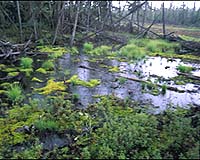| . |  |
. |
College Park MD (SPX) Jun 09, 2009 Cutting down forests for agriculture vents excess carbon dioxide into the air just as industrial activities and the burning of fossil fuels do. But whether policies to stabilize greenhouse gases in the atmosphere should include this terrestrial source of carbon dioxide is under debate. According to a new study in Science, failing to include land use changes in such policies could lead to massive deforestation and higher costs for limiting carbon emissions. The results also suggest improved agricultural technology will be as important as new energy technologies in a carbon-limited future. To understand the effects of economic forces from climate policy on terrestrial carbon and land use changes, researchers with the Joint Global Change Research Institute in College Park, Md., a collaboration between the Department of Energy's Pacific Northwest National Laboratory and the University of Maryland, used an integrated assessment model called MiniCAM to compare different scenarios. This computer model incorporates economics, energy, agriculture, land-use changes, emissions and concentrations of greenhouse gases in order to understand the way that human decisions interact with natural processes that control climate. For this study, the researchers set the highest concentration that carbon dioxide could reach. Then they compared two ways to stay within that limit: in one, they taxed terrestrial carbon emissions and industrial and fossil fuel emissions all at the same rate. In the other, they only taxed emissions from industry and fossil fuels. Ignoring terrestrial carbon led to nearly complete loss of unmanaged forests by 2100, largely as a result of massive expansions of bioenergy crops - those planted to reduce the use of fossil fuels - replacing forests. However, placing a value on terrestrial carbon emissions led to increased forest cover, while bioenergy still expanded considerably compared to today. "When society tries to limit carbon dioxide concentrations, if terrestrial carbon emissions aren't valued but fossil fuel and industrial emissions are, economic forces could create very strong pressures to deforest," said PNNL scientist Marshall Wise, the study leader. In addition, the cost to reduce global emissions in a world that valued terrestrial, fossil fuel, and industrial sources dropped to half that of the world in which only fossil fuel and industrial entities paid to emit carbon. This suggests that storing carbon in forests, agricultural areas, and other ecosystems is an important and cost-effective part of a bigger carbon dioxide emissions control strategy that includes dramatic changes to the global energy system. This study also shows that continual improvement in agricultural crop productivity for crops like corn, wheat, barley, and rice will be required to best make use of limited cropland. This suggests improvements to agriculture technology could be as important as improvements to energy technology in controlling carbon emissions. "If society wants to stabilize carbon dioxide concentrations at low levels, then we can't ignore the two thousand billion tons that are out there in terrestrial systems," said PNNL economist James Edmonds at the JGCRI. Share This Article With Planet Earth
Related Links DOE/Pacific Northwest National Laboratory Forestry News - Global and Local News, Science and Application
 Nurturing forests, peatlands will attack global warming: UNEP
Nurturing forests, peatlands will attack global warming: UNEPParis (AFP) June 5, 2009 Fixing deforestation, preserving peatlands and ending reckless agricultural methods could be a major weapon in tackling climate change, the UN Environment Programme said on Friday. Biological systems, if responsibly managed, can absorb billions of tonnes of the dangerous carbon gases that fuel the greenhouse effect, the agency said in a report coinciding with World Environment Day. ... read more |
|
| The content herein, unless otherwise known to be public domain, are Copyright 1995-2009 - SpaceDaily. AFP and UPI Wire Stories are copyright Agence France-Presse and United Press International. ESA Portal Reports are copyright European Space Agency. All NASA sourced material is public domain. Additional copyrights may apply in whole or part to other bona fide parties. Advertising does not imply endorsement,agreement or approval of any opinions, statements or information provided by SpaceDaily on any Web page published or hosted by SpaceDaily. Privacy Statement |